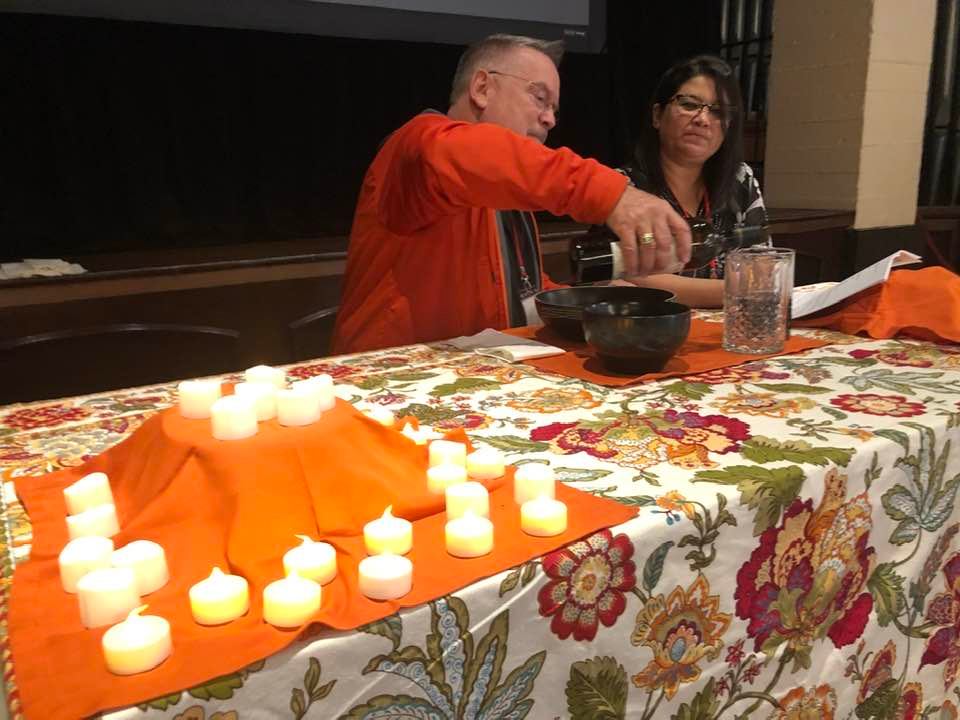
The Rev. Canon Thomas Quijada-Discavage and the Rev. Norma Yanira Guerra setting the table at the recent Episcopal Diocese of Los Angeles clergy conference, or, as we call it now, the Orange Mass. Photo: John Taylor
The General Convention of the Episcopal Church is expected to decide this summer if Holy Baptism should still be required before people take Holy Communion in The Episcopal Church. No one likes contentious debates. But in the church, as contentious debates go, this is one one of the most fateful — so Good Lord, forgive us our passion about the things we love most.
It’s usually framed as a choice between welcome and tradition. And you know what? It is. And both things are good. So the Anglican naturally asks themselves if we can have both good things. Maybe one answer is to stop being so sure about it ourselves and, instead, leave it to God and God’s people.
For some in our beloved church, which has so recently put new stress on our ancient understanding of Holy Baptism as the pivotal sacrament, it can be hard to hear that it should now take a secondary role in the name of welcome.
To those who stress welcome, it can be frustrating to hear that unchurched people, who may come through our doors as guests or searchers in these secularizing times, should take a secondary role in a Holy Eucharist service by being denied access to the sacrament, perhaps to end up wandering out again and never returning to Christ.
I’m not much of a theologian, so I won’t wade too much further into the depths and intricacies. I do believe that our God in Christ sorts all this out for us. I also believe in the privilege and responsibility the free person themselves has to know the rules and traditions, to know their heart and their deepest spiritual needs, and then choose for themselves.
For instance, when I go to a Roman Catholic parish where I’m known not to be a baptized Roman Catholic, I don’t take communion, because I know it would put the priest in an uncomfortable position. And yet from his blessing traced on my forehead, I have received, just as much as I receive when I go to mass anonymously and take the body and blood from a stranger. The sacramental power can’t be stopped, when my heart is prepared to receive it.
That clause at the end, incidentally, comes from my Christian formation. Along with all adult baptism candidates and all confirmation candidates, I’ve been taught that mass isn’t magic time. Having heard the word of God and participated in the rite of confession and absolution, I come to the altar to receive Christ in my heart. Does the unbaptized first-timer come that way? Or do they bring prior understandings or rumors that suggest something magic is going to happen, or nothing remarkable at all other than a meal?
This is why I think we always owe those whom we welcome the added gift of gracious teaching. So perhaps a both-and solution, a rubric that respects the dignity and discernment of the free people of God by saying: “By long-standing tradition, The Episcopal Church offers Holy Communion to all baptized persons. If you are not baptized, but wish to receive, we invite you to participate fully in the first part of the service, hearing God’s word and reflecting on your life, enabling you to come to the table for communion, if you so choose, with a heart open to the Spirit of the living God. We hope that if you feel touched by word and sacrament and wish to learn more about the life-giving power of the spirit of the Risen Christ, you will contact XXXXX to inquire about participating in Holy Baptism.”
